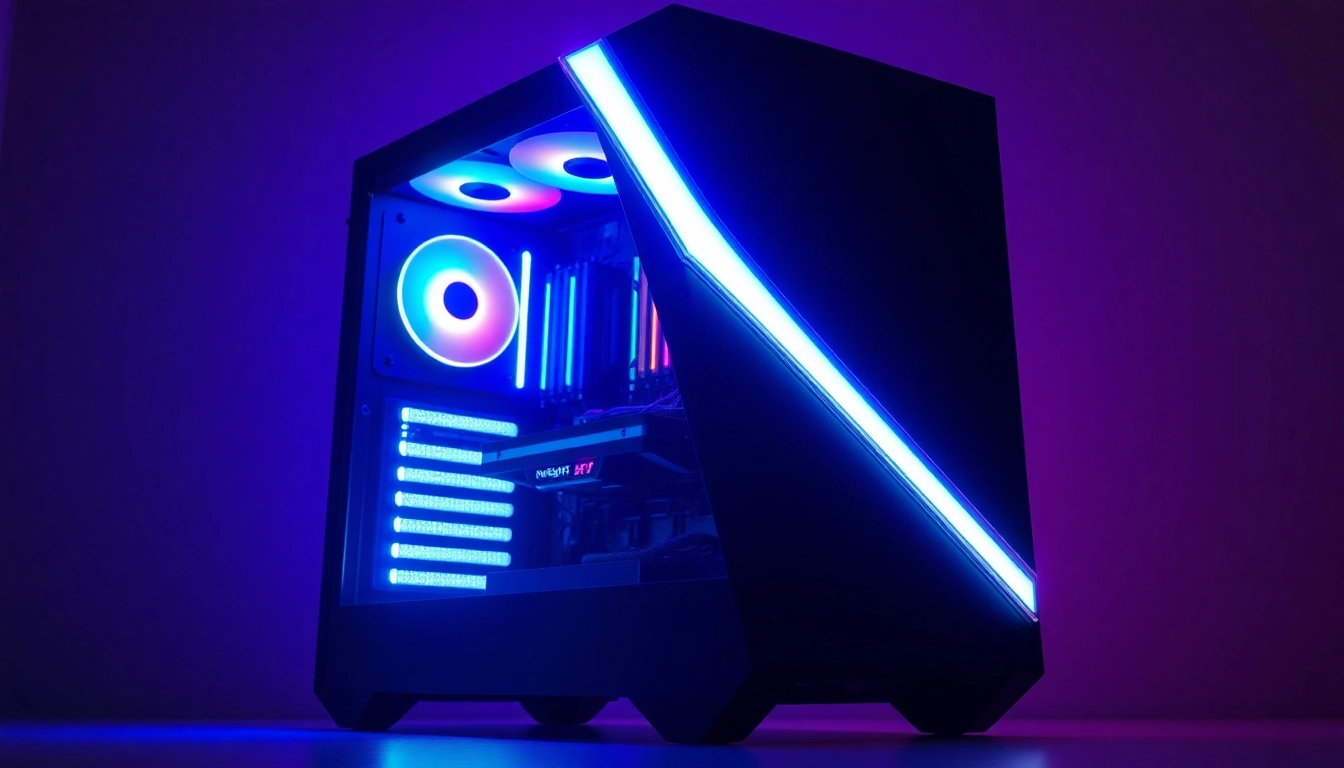Understanding Custom Gaming PC Cases
What is a Custom Gaming PC Case?
A custom gaming PC case is a personalized enclosure designed specifically for housing the internal components of a gaming computer. Unlike standard cases, custom options allow users to choose designs, sizes, materials, and additional features that cater to their aesthetic preferences and functional requirements. These cases are tailored to accommodate various hardware configurations, airflow designs, and optical aesthetics, ensuring that every gaming rig is unique to its owner.
In recent years, the demand for custom gaming pc case solutions has surged, driven by gamers and enthusiasts who are eager to express their individuality and achieve optimal performance through bespoke designs. Custom cases can be made from a variety of materials such as tempered glass, aluminum, and acrylic, which not only add to the durability but also enhance visual appeal through LED lighting and custom graphics.
Benefits of Custom Gaming PC Cases
The benefits of opting for a custom gaming PC case extend beyond mere aesthetics. Here are some significant advantages:
- Enhanced Cooling: Custom cases often include advanced cooling options, such as additional fans, liquid cooling systems, and optimized airflow designs that significantly improve thermal performance.
- Personalization: Users can choose from a variety of colors, designs, and themes to align with their gaming setups. This makes the PC not just a tool but a piece of art that complements their living space.
- Better Compatibility: Custom cases can accommodate specific hardware requirements, including large GPUs or unique cooling solutions that standard cases may not support.
- Durability: Higher quality materials used in custom cases generally lead to better longevity and protection for internal components.
- Improved Cable Management: Many custom cases come with built-in cable management solutions that help keep wires organized, improving airflow and aesthetics.
Key Features to Look for in Custom Gaming Cases
When searching for the perfect custom gaming case, several features should be prioritized:
- Size Compatibility: Ensure the case accommodates your motherboard size, whether it’s ATX, Micro-ATX, or Mini-ITX.
- Airflow Design: Look for cases that provide options for multiple fans or radiators to improve cooling efficiency.
- Material Quality: Choose cases made from high-quality materials that offer durability and aesthetic appeal.
- Expandability: A good custom case should have enough space for future upgrades, including additional drives and GPU expansion.
- Noise Dampening: Consider cases designed with noise-reduction features, making for a quieter gaming experience.
Design Options for Custom Gaming Cases
Choosing the Right Style: ATX vs ITX
Two major form factors dominate the market for gaming PC cases: ATX (Advanced Technology Extended) and ITX (Information Technology Extended). Understanding their differences will help you choose the best fit for your needs.
ATX Cases: These typically provide more space for additional components and are better suited for high-performance gaming rigs. They offer more drive bays and expansion slots, making them ideal for enthusiasts who plan on utilizing multiple GPUs or extensive cooling setups.
ITX Cases: These are compact and suited for users with space constraints or those seeking portable solutions. Despite their smaller size, many ITX cases manage to include innovative designs to enhance airflow and accommodate high-performance components.
Popular Themes and Aesthetics in Custom PC Cases
Theming is increasingly popular in custom gaming PCs. Here are some notable aesthetics:
- Minimalistic: Clean lines and subdued color palettes focus on functionality while maintaining an elegant look.
- Cyberpunk: Bright neon colors, intricate patterns, and futuristic designs capture the essence of technology.
- Retro: Vintage designs often evoke nostalgia, featuring designs and colors reminiscent of older gaming consoles or PCs.
- Anime and Pop Culture: Cases adorned with artwork or themes from popular anime, movies, or video games appeal to fans wanting to showcase their interests.
How to Personalize Your Custom Gaming PC Case
Personalizing your custom gaming PC case can be achieved through a variety of methods:
- Custom Paint Jobs: Investing in a custom paint job can transform a standard case into a unique masterpiece.
- Vinyl Wraps: For DIY enthusiasts, vinyl wraps featuring graphics, textures, or colors can add personality without permanent modifications.
- LED Lighting: Incorporating LED strips or RGB lighting can add vibrancy and highlight the interior components of your build.
- Laser Etching: Some services offer laser etching for logos, names, or artwork on the side panels of the case, making it truly unique.
- Pops of Color: Adding colored accents or components, such as a colored PSU or fans, can easily personalize the look at a minimal cost.
Building Your Custom Gaming PC Case
Essential Tools for Building Your Custom Gaming Case
When embarking on a DIY custom gaming PC project, having the right tools on hand will facilitate a smoother build process. Essential tools include:
- Phillips screwdrivers: A variety of sizes will make it easier to secure the motherboard, drives, and various components.
- Anti-static wrist strap: This is vital for preventing electrostatic discharge (ESD) that can damage sensitive PC components.
- Cable ties: For effective cable management, keeping your build tidy and ensuring optimum airflow.
- Thermal paste: Necessary for applying between the CPU and cooler to ensure proper thermal conductivity.
Step-by-Step Guide to Assembly
Here’s a step-by-step approach to assembling your custom gaming PC case:
- Prepare the Workspace: Find a clean and organized workspace with plenty of space to move around.
- Install the Power Supply: Secure the PSU in the designated compartment, paying attention to cable management options.
- Motherboard Installation: Prepare the motherboard by installing the CPU and RAM. Secure it into the case with screws.
- Install Storage Drives: Secure your SSDs or HDDs into their designated bays, connecting them with the SATA cables.
- Affix the GPU: Slot in your graphics card, ensuring it is secured properly and connected to the PSU.
- Manage Cables: Organize and tie down the cables for a clean look, preventing obstruction of airflow.
- Add Cooling Systems: Install any cooling fans or radiators necessary for maintaining optimal temperatures.
- Final Checks: Ensure all components are securely connected, then power on the system to test functionality before closing the case.
Troubleshooting Common Issues During Build
Even with careful planning, issues can arise during assembly. Here are common problems and their solutions:
- No Power: If the PC doesn’t power on, check all cable connections and ensure the power supply is functional.
- Overheating: If components are overheating, reassess the airflow layout and verify that all cooling fans are operational.
- System Instability: Unstable systems may indicate improperly seated components or driver issues; recheck the installation of the RAM and GPU.
Where to Purchase Custom Gaming PC Cases
Top Retailers for Custom Gaming PC Cases
When considering where to purchase a custom gaming PC case, the options range from established brands to boutique manufacturers. Here are some reputable retailers and brands in the market:
- HYTE: Known for stylish designs and ease of assembly, HYTE offers a range of options for both ATX and ITX cases.
- Vyral: Famous for unique prints and designs, they offer full customization options on panels, catering to personal tastes.
- ORIGIN PC: They provide cases with advanced modding options, ideal for gamers looking to create a professional appearance.
- NZXT: Offers high-quality cases along with a builder program for personalized setups.
- Micro Center: For a hands-on experience, this retail chain offers an extensive selection of gaming PC cases in-store.
Online Marketplaces vs Local Shops
Choosing between online marketplaces and local shops will depend on your preferences:
- Online Marketplaces: Sites like Amazon, Newegg, and eBay provide extensive options often at competitive prices but lack personalized customer service.
- Local Shops: Local computer hardware stores allow you to physically inspect cases, consult with experts, and often provide immediate inventory.
Comparing Prices and Quality in Custom Gaming PC Cases
Before finalizing your purchase, comparing prices across platforms can lead to significant savings. Additionally, reviewing customer feedback and quality assessments can help identify cases that provide the best value. Points to consider include:
- Material Quality: Higher-quality materials tend to yield better durability and aesthetics.
- Brand Reputation: Established brands usually offer reliable warranties and support.
- Customization Options: Evaluate how flexible the customization options are against their price point.
Maintaining Your Custom Gaming PC Case
Cleaning and Care Tips for Longevity
Regular maintenance ensures that your custom gaming PC case remains in top shape. Here are some effective methods for cleaning and caring for your case:
- Dusting: Regularly dust off the exterior and use a can of compressed air to clean out dust from fans and vents.
- Cleaning Solution: For surfaces, use a gentle cleaning solution that is safe for the materials of your case.
- Check Components: Regularly check that all internal components are securely fastened and free of dust accumulation.
Improving Airflow and Cooling Efficiency
Just as important as keeping components clean is ensuring efficient airflow within your case:
- Fan Placement: Strategically positioning intake and exhaust fans can optimize airflow. Usually, front and bottom fans should pull air in, while rear fans should expel it.
- Positive Air Pressure: Create positive pressure by having more intake than exhaust, effectively reducing dust accumulation inside the case.
- Use High-Performance Fans: Invest in high-quality, high-CFM (cubic feet per minute) fans for enhanced airflow and quieter operation.
Upgrading Components in Your Custom Gaming PC Case
To keep your PC gaming experience top-notch, consider these strategies for upgrading components:
- Graphics Cards: Upgrading to a more powerful GPU can significantly boost gaming performance, especially in graphically intensive titles.
- Storage Solutions: Opt for NVMe SSDs over traditional HDDs for shorter load times and smoother gameplay.
- Cooling Systems: As gaming demands increase, upgrading to a more robust cooling solution can prevent overheating and maintain performance stability.








